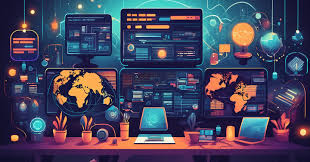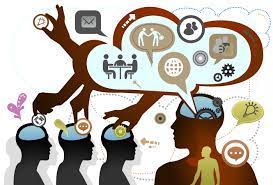Latest Developments in the World of Technology
The realm of technology is ever-evolving, with groundbreaking innovations and advancements emerging at a rapid pace. From artificial intelligence to quantum computing, recent developments are set to transform industries and redefine the way we live and work.
Artificial Intelligence: Beyond Human Capabilities
Artificial intelligence (AI) continues to make significant strides, with new algorithms and models enhancing machine learning capabilities. AI is now being integrated into various sectors such as healthcare, finance, and transportation. Recent advancements have led to improved diagnostic tools in medicine, more efficient financial forecasting models, and autonomous vehicles that promise safer roads.
Quantum Computing: The Next Frontier
Quantum computing is no longer a distant dream but an emerging reality. Tech giants like IBM and Google are making substantial progress in developing quantum processors that can solve complex problems beyond the reach of classical computers. This technology has the potential to revolutionise fields such as cryptography, materials science, and drug discovery.
5G Connectivity: A New Era of Communication
The rollout of 5G networks is set to change the landscape of global communication. Offering faster speeds and more reliable connections, 5G technology will enable innovations such as smart cities, advanced IoT applications, and enhanced virtual reality experiences. Countries around the world are racing to implement this technology, promising a future where connectivity knows no bounds.
Sustainable Technology: Innovations for a Greener Future
As concerns about climate change grow, sustainable technology has become a focal point for innovation. Advances in renewable energy sources such as solar panels and wind turbines are making clean energy more accessible than ever before. Additionally, breakthroughs in battery storage technologies are addressing one of the biggest challenges in renewable energy adoption.
The Future Awaits
The technological landscape is constantly shifting, driven by relentless innovation and discovery. As these advancements continue to develop, they hold the promise of solving some of humanity’s most pressing challenges while opening up new possibilities for future generations.
Exploring the Future: Key Questions on Technological Advancements and Challenges
- What are the latest technological advancements in the industry?
- How is artificial intelligence revolutionising various sectors?
- What is the impact of quantum computing on traditional computing methods?
- How will 5G connectivity change the way we communicate and interact with technology?
- What are some examples of sustainable technology innovations for a greener future?
- How can I stay updated with the rapidly evolving world of technology news?
- What are the key challenges faced by tech companies in implementing new technologies?
- Are there any ethical concerns surrounding emerging technologies like AI and biotechnology?
What are the latest technological advancements in the industry?
Inquiring about the latest technological advancements in the industry is a common query that reflects a keen interest in staying abreast of cutting-edge developments. From artificial intelligence and quantum computing to 5G connectivity and sustainable technology, the industry is witnessing rapid progress across various fronts. These advancements have the potential to revolutionise sectors such as healthcare, finance, communication, and environmental sustainability. By keeping a pulse on these latest innovations, individuals and organisations can harness the power of technology to drive efficiency, competitiveness, and positive change in an ever-evolving landscape.
How is artificial intelligence revolutionising various sectors?
Artificial intelligence (AI) is revolutionising various sectors by enhancing efficiency, improving decision-making, and creating innovative solutions to complex problems. In healthcare, AI is being used to develop advanced diagnostic tools that can detect diseases earlier and more accurately than traditional methods. In the financial sector, AI algorithms are transforming risk assessment and fraud detection, allowing for more secure and efficient transactions. The manufacturing industry benefits from AI through automation and predictive maintenance, leading to increased productivity and reduced downtime. Retail businesses are leveraging AI for personalised marketing strategies and inventory management. Additionally, AI-powered chatbots and virtual assistants are improving customer service across multiple industries. By integrating AI technologies, these sectors are experiencing significant advancements that drive growth and improve outcomes.
What is the impact of quantum computing on traditional computing methods?
The impact of quantum computing on traditional computing methods is profound and far-reaching. Quantum computing harnesses the principles of quantum mechanics to perform calculations at speeds unimaginable with classical computers. This revolutionary technology has the potential to solve complex problems exponentially faster, disrupting traditional computing paradigms. While traditional computers operate based on binary bits (0s and 1s), quantum computers use quantum bits or qubits, which can exist in multiple states simultaneously. This ability to leverage superposition and entanglement enables quantum computers to tackle computations that are currently infeasible for classical systems. As quantum computing continues to advance, it poses both challenges and opportunities for the future of technology, promising a new era of computational power and problem-solving capabilities.
How will 5G connectivity change the way we communicate and interact with technology?
The advent of 5G connectivity heralds a transformative shift in the way we communicate and interact with technology. With its unparalleled speed and low latency, 5G will revolutionise the digital landscape by enabling seamless connectivity for a myriad of devices. This ultra-fast network will not only enhance our mobile experience but also pave the way for innovative applications such as augmented reality, virtual reality, and Internet of Things (IoT) devices. The increased bandwidth and reliability of 5G will empower us to engage with technology in ways previously unimaginable, ushering in a new era of interconnectedness and digital possibilities.
What are some examples of sustainable technology innovations for a greener future?
In the quest for a greener future, sustainable technology innovations play a pivotal role in addressing environmental challenges. Examples of such innovations include advancements in renewable energy sources like solar panels and wind turbines, which harness natural resources to generate clean electricity. Additionally, breakthroughs in energy-efficient building materials and smart grid systems are revolutionising the way we consume and manage energy. The development of electric vehicles powered by sustainable energy sources is also contributing to reducing carbon emissions and combating air pollution. These sustainable technology solutions are paving the way towards a more environmentally friendly and sustainable future for generations to come.
How can I stay updated with the rapidly evolving world of technology news?
To stay updated with the rapidly evolving world of technology news, there are several effective strategies you can employ. Firstly, subscribing to reputable tech news websites, newsletters, and podcasts can provide you with daily insights and updates on the latest trends and innovations. Following influential tech experts and thought leaders on social media platforms like Twitter and LinkedIn can also offer real-time information and analysis. Additionally, attending tech conferences, webinars, and workshops can help you network with industry insiders and gain firsthand knowledge of emerging technologies. Lastly, setting up Google Alerts for specific tech topics of interest ensures that you receive notifications whenever new information is published online. By combining these approaches, you can stay informed and engaged in the dynamic world of technology news.
What are the key challenges faced by tech companies in implementing new technologies?
Tech companies often encounter several key challenges when implementing new technologies. One major obstacle is the rapid pace of technological change, which requires companies to constantly adapt and stay ahead of the curve. Additionally, issues related to data privacy and security pose significant concerns, especially with the increasing amount of sensitive information being collected and processed. Another challenge is the need for skilled professionals who can effectively utilise and manage new technologies, highlighting the importance of ongoing training and talent acquisition. Furthermore, navigating regulatory frameworks and compliance requirements can present hurdles for tech companies looking to innovate while ensuring legal adherence. Overall, overcoming these challenges demands a strategic approach, continuous learning, and a proactive mindset in embracing technological advancements.
Are there any ethical concerns surrounding emerging technologies like AI and biotechnology?
Emerging technologies such as artificial intelligence and biotechnology bring with them a host of ethical concerns that are increasingly being debated by experts and the public alike. In the realm of AI, issues such as privacy, data security, and the potential for bias in algorithms are significant concerns. There is also the fear of job displacement as automation becomes more prevalent. With biotechnology, ethical questions arise around genetic modification, cloning, and the potential for creating inequalities in access to advanced medical treatments. Moreover, both fields face scrutiny over their impact on human rights and societal norms. As these technologies continue to advance, it is crucial for policymakers, technologists, and ethicists to collaborate in ensuring they are developed and implemented responsibly, with a focus on safeguarding human dignity and promoting equitable outcomes.




